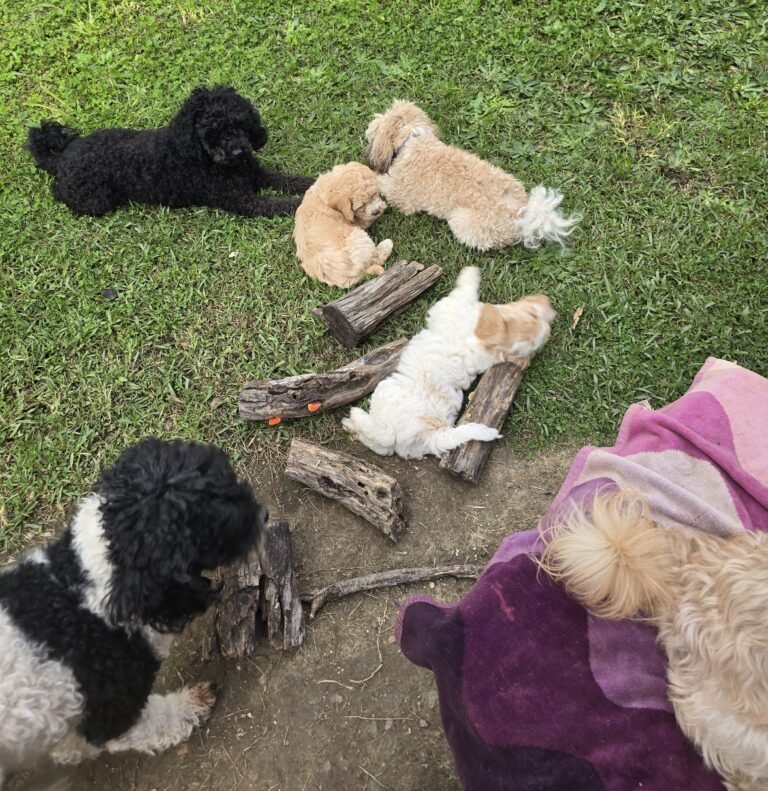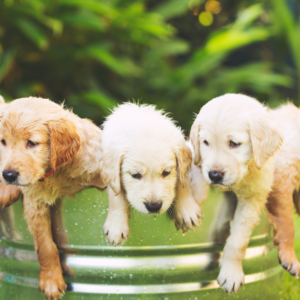🐾 What a Modern Professional Breeder Should Be Doing
If you want a puppy who grows into a confident, resilient, and well-adjusted adult dog, it takes more than just feeding and housing them for 8 weeks. A good breeder is not just a caretaker — they are the puppy’s first trainer, socialisation coach, and emotional guide. Here’s what you should be asking breeders about before you commit.
🍼 Early Development (0–3 Weeks)
- Whelping Area: Clean, warm, quiet, and safe space for mum and pups.
- Care of Mum: Monitoring the mother’s health, ensuring she is producing enough milk, and stepping in if a pup isn’t getting enough feeding or attention.
- Equal Care for Puppies: Daily checks to make sure all puppies are feeding, thriving, and getting equal time with mum.
- Early Neurological Stimulation: Gentle handling exercises that build resilience and stress tolerance.
- Exposure to Household Noises: Even before their eyes open, puppies absorb sounds — so normal household noises (TV, vacuum, conversation) should be part of daily life.
🐾 Socialisation & Exposure (3–8 Weeks)
- Handling for Grooming: Touching paws, nails, ears, mouth, and gently moving limbs to prepare for grooming and vet handling.
- Household & Outdoor Exposure: Once mobile, pups are moved out of the whelping box into a larger area with more household exposure. Safe supervised outdoor time is introduced.
- Gentle Challenges: Different surfaces, toys, and play areas to build confidence.
- Food Training: Introduction to solid food, learning how to share with littermates, and establishing calm meal routines.
- Positive Human Interaction: Daily cuddles and play with adults and (supervised) children.
🎓 Enrichment & Early Training (6–16 Weeks)
- Crate and Toilet Training Foundations: Early routines make house training easier for new owners.
- Dog Door Training: Introduction to using a dog door (if safe) to encourage independence and smooth toilet training.
- Confidence Building: New sights, smells, and safe adventures in controlled environments.
- Introduction to Grooming: Brushing, nail trims, ear checks to make vet/groomer visits stress-free later.
- Leash & Recall Practice: Short, positive sessions to get them ready for walks.
- Problem Prevention: Exposure to noises, car rides, different people, and gentle challenges.
(Check out my YouTube channel showing this process in action for buyers to see)
🧠 Health & Temperament Testing
- DNA and Health Testing: To reduce the risk of hereditary diseases.
- Vet Checks: At appropriate milestones (6 weeks, microchipping, vaccinations).
- Temperament Observation: Matching puppies to homes based on personality, not just colour.
⚠️ Warning About Minimum-Standard Breeders
Not all breeders do these things. Some do the bare minimum — feed, house, and send them home at 8 weeks without exposure, training, or socialisation. These puppies can grow up anxious, fearful, and hard to train. Don’t be afraid to ask questions and walk away if a breeder isn’t providing proper enrichment.
📋 Questions to Ask a Breeder
- How do you socialise your puppies between 3–16 weeks?
- Do you introduce crate training, toilet training, leash practice, and dog door training?
- How do you prepare puppies for grooming and vet visits?
- What enrichment activities do you use to build confidence?
- How do you match puppies to homes?
- What kind of post-purchase support do you offer?
A truly professional breeder sets their puppies up for life, not just for sale. When you choose a breeder who invests in enrichment, training, and early socialisation, you’re giving yourself the best chance of raising a calm, confident, and happy adult dog.
Final Thoughts
Are you choosing a breeder who does proper enrichment, training, and socialisation during 6–16 weeks? (Read what this should be)
What a Modern Professional Breeder Should Be Doing
If you want a puppy who grows into a confident, resilient, and well-adjusted adult dog, it takes more than just feeding and housing them for 8 weeks. A good breeder is not just a caretaker — they are the puppy’s first trainer, socialisation coach, and emotional guide. Here’s what you should be asking breeders about before you commit.
If you are then take advantage of their knowledge and skills and allow them to raise your puppy to an older age.


Kareema
Healing Energy Animals
Kareema is the owners of Healing Energy Animals where devil dogs, horrible horses and crazy cats are turned into perfect pets using Relationship Animal Training and over 50 years of experience training a wide variety of animals.
Healing Energy Animals provides owners and pet professionals assistance with with common pet behavior training, feeding and grooming issues such as barking, escaping, scratching, aggression and fleas. Kareema consults and writes widely on a range of pet care issues for owners and also assists pet care professionals in setting up and growing their businesses by the provision of customer handling advice, sales and marketing strategies and up to date product information that allows for the differentiation of their pet care business from their competitors.
Healing Energy Animals is an Australian business but operates worldwide via the provision of virtual services.








